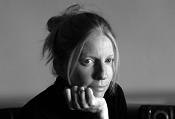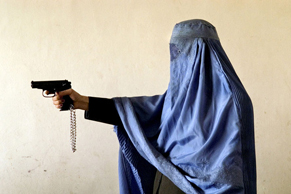Forsaken, not forgotten / Lana Šlezi

‘I am an Afghan woman
It only makes sense to moan’
(Final stanza from a poem by Nadia Anjuman)
SPECIAL PROFILE
Malalai, the first policewoman in Kandahar (an image that appears in Forsaken) © 2007 Lana Šlezić
Photo: Portrait of Lana Šlezić
Lana Šlezić

There's nothing shocking about the final stanza of the poem. Blunt and calloused: devoid of any florid verse, it deftly punctuates a volume of images that has captured global attention, making American Photo Magazine's
'Best Photo Books of 2007'.
Positioned at the end of Forsaken, the poem, like the piercing honesty of close to 60 images within - the work of award-winning Canadian photographer Lana Šlezić - whispers about the realities of life for women in Afghanistan.
An 11-year-old girl, physically and emotionally scarred: sold by her stepfather for $60 at the age of four, married the same year, only to be beaten with electric cables, rocks and wood. Widows forced into underground prostitution, moving every few months for fear neighbours may find out and have them killed. Wives and daughters, subject to domestic violence, forced marriage, seclusion, lack of freedom and illiteracy - many of them desperate enough to set themselves on fire.
In context, the poem is not shocking. It dares utter the truth: "Me and my strained solitude. With sorrow and sadness. I was born for nothingness. My mouth should be sealed."
What is shocking, however, is the discovery that it is an epitaph of sorts. The scribe, a young woman found dead: her head bloody and bruised, and her husband and
mother-in-law imprisoned.
"I wish I could have met Nadia Anjuman," writes Lana Šlezić in a postscript to Forsaken, her debut book, first published in Canada last September, and available in the UK through Mets & Schilt and foto 8. "Her courage to express herself during a time of extreme threat and oppression has always moved me." (read full poem, right)
Upon meeting Ms Šlezić, 35, who in April added a 2008 World Press Photo prize to her swag of awards, it soon becomes obvious that Forsaken is as much about the women whose faces made its pages as those who didn't. Her latest award (third prize for stories under Portraits category) is for a new set of images featuring Afghan women to be published in an as yet untitled book.
"For any women whose lives I thought could be endangered [by being in Forsaken], either I didn't photograph their faces or only partially photographed them, and I didn't identify them," Ms Šlezić told Canada Focus in the lead-up to a Canada House exhibition (April 25 to June 6) showcasing a selection of images from Forsaken.
"And there were some I couldn't put in the book."
She is quick to recount one case that didn't make it: the story of two teenage girls, who she met in prison - 'the safest place for them' after they were raped and would have been killed had they stayed with their families.
Making Headlines
•Focus on Afghanistan•
A Poem by Nadia Anjuman
Translated by Mahnaz Badihian
[Published in Forsaken by Lana Šlezić]
No desire to open my mouth
What should I sing of...?
I, who am hated by life.
No difference to sing or not to sing.
Why should I talk of sweetness,
When I feel bitterness?
Oh, the oppressor's fist
Knocked my mouth.
I have no companion in life
Who can I be sweet for?
No difference to speak, to laugh,
To die, to be.
Me and my strained solitude.
With sorrow and sadness
I was born for nothingess.
My mouth should be sealed.
Oh my heart, you know it is spring
And time to celebrate.
What should I do with a trapped wing,
Which does not let me fly?
I have been silent too long,
But I never forget the melody,
Since every moment I whisper
The songs from my heart,
Reminding myself of
The day I will break this cage,
Fly from this solitude
And sing like a melancholic.
I am not a weak poplar tree
To be shaken by any wind.
I am an Afghan woman.
It only makes sense to moan.
"The idea of an honour killing - that these girls, who were raped, would be killed to save the honour of their families - is barbaric and something stuck in the 17th century," she said. "It made me angry and sad and devastated and a bit guilty at the end of the day, that I could go home to Canada."
Ms Šlezić pauses on another story, of Anargul, a middle-aged woman who served tea during one of her meetings with Malalai (pictured, top of page), a famous police officer in Kandahar, one of relatively few women in a position of authority.
As she noted in a series of short narratives that intersperse the images (underscoring her experience working on newspapers, having scored an internship on the Globe and Mail at the start of her career and, as a freelancer, working with titles of the likes of National Geographic), it was only when the police woman shuffled through a pile of Polaroids that she recognised the woman's face among the cases of abuse.
"In the square frame of the Polaroid, she stood wearing metal chains wrapped around her wrists," she said, explaining that Anargul, a widow, aged 45, was forced to marry her husband's brother, who dug a hole beneath the first floor of his house, deep enough to beat her without neighbours hearing, keeping her there nine months and feeding her only bread and water.
Listening to the stories, it is not hard to understand how social justice became a driving force behind Ms Šlezić's work. She, however, is the first to admit: "I came to Afghanistan with one set of ideas and left with a completely different set."
Indeed, what started out in 2004 as a six-week assignment for Canadian Geographic, posted with the Canadian Forces (at the time performing a peacekeeping role in Kabul) three years after the fall of the Taliban, turned into a two-year journey.
"Afghanistan almost entered my body," said Ms Šlezić, who first discovered life through a lense - 'like a switch had been flipped' - when her father, a hobby photographer, gave her a manual Pentax camera and a dozen rolls of film (not to mention sound advice to use 'F8 or F11 at a 60th of a second') as she set off to travel through Asia in her early twenties.
Unaware of the true plight facing Afghan women, she said the seed for Forsaken was planted when she met a widow forced into underground prostitution, and was taken to her home in a van with drawn curtains to keep the location secret.
"These women had to move every few months because if neighbours ever caught on they would be killed," she said, adding that her 'jaw hit the floor' upon hearing the stories of every woman and girl featured in the book.
"I'd wake up every day and think 'How do they do this? How do they live like this?' - it's just so hard to explain the kind of desperation and fear and lack of freedom they face: a total absence of spirit or hope."
Sadly, her words echoed in data from the Afghan Independent Human Rights Commission, which recorded 2,374 cases of reported violence against women in 2007, including 165 cases of women setting themselves on fire. Countless others went unreported.
What's more, according to the United Nations, an Afghan woman dies every 29 minutes due to reproductive health related complications, and average life expectancy is 44 years.
Ranking among the top five development donors in Afghanistan, Canada has committed
$1.3 billion over 10 years, including a recent pledge of $5 million to help eliminate discrimination against women and girls.
On a more positive note, latest statistics show more than six million Afghan children now attend school - a third being girls compared to none under Taliban rule. Women (many of them among the five million returning refugees) now have universal rights to vote, work and study. They represent 27 per cent of the Afghan National Assembly and account for
25.9 per cent of all civil servants.
The Government of Canada has also helped with the provision of savings and loan services through a highly successful microfinance programme to more than 480,000 Afghans, nearly three quarters of them women.
Hope exists, agrees Ms Šlezić, a supporter of the international community's mission to help rebuild Afghanistan, but cautions that for the lot of women and girls to improve, change must happen from within Afghan society and institutions.
Forsaken, she hopes, will open the eyes of the world to the real situation facing Afghan women. A book she dedicates to her mother, her 'translator' and close friend Farzana, and to 'all Afghan women - may you suffer less'.